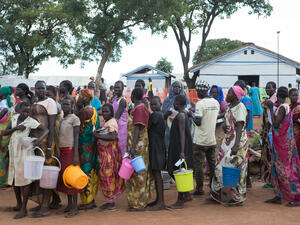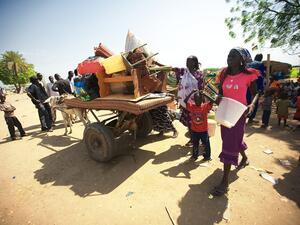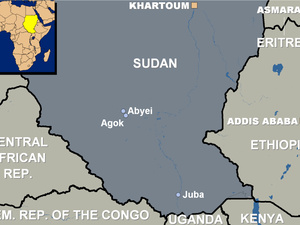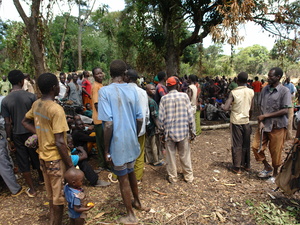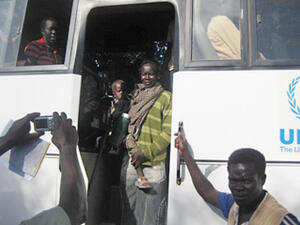Last UNHCR flight from Central African Republic brings refugees to Sudan
Last UNHCR flight from Central African Republic brings refugees to Sudan
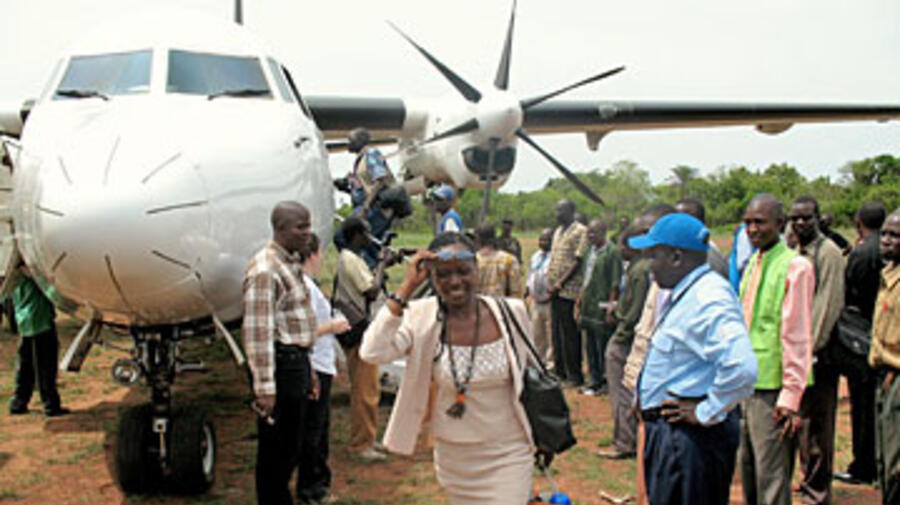
In Nzara, Sudanese refugees on the last official repatriation flight from Central African Republic are welcomed by the local authorities and UNHCR staff.
NZARA, South Sudan, April 12 (UNHCR) - UNHCR said on Thursday it had organised its last voluntary repatriation flight for southern Sudanese refugees in the Central African Republic a day after a plane landed here in Western Equatoria state carrying 31 returnees. A cheering crowd, song and dance troupes and government dignitaries welcomed the last group.
With Wednesday's flight, which took off from Bangui, some 8,400 refugees have returned home to South Sudan from the Central African Republic (CAR) since February 2006 on flights organised by the UN refugee agency and the International Organization for Migration. Another 1,319 Sudanese who arranged their own return by road also received help from UNHCR to ease their reintegration.
Earlier, at Bangui airport, the head of the refugee agency's CAR mission welcomed the event. "With this last flight, the Central African Republic is the first among the six neighbouring countries hosting Sudanese refugees to finish the voluntary repatriation operation, and this is an important step forward for the UNHCR programme in South Sudan," Bruno Geddo said at the airport.
"We are grateful for the hospitality of the Central African people and the patience and endurance of the refugees," he added.
Members of the 12 families on the last flight were excited to be going back home after so many years in exile. "I left Sudan in 1990 when I was twelve, so I don't really know much about my country anymore. But I'm happy to go back home," said Chirakka Ibrahim, looking down on South Sudan's forests as the plane flew over.
Louise Dette, 19, another returnee who had spent most of her life in Bangui, said she hoped to continue her high school studies in southern Sudan, which suffers from a chronic shortage of infrastructure and basic services after more than two decades of war.
UNHCR is engaged in reintegration projects in major areas of return, including health, educational, water and sanitation, agricultural and livelihood projects. Around 100 projects are under way or planned for this year.
The last repatriation flight out of the CAR came just two days after a chartered plane landed in Yambio, South Sudan from Ethiopia carrying the 50,000th refugee to be repatriated to South Sudan from six other African countries with UNHCR help since peace returned to the south in early 2005.
UNHCR launched the organised voluntary repatriation from the CAR in February 2006, a day after Sudan and the CAR signed an agreement with UNHCR providing the legal framework for the returns. The repatriation flights were suspended from April to December last year due to the closure of the border between the two countries.
Most of the Sudanese refugees in the CAR had settled around the village of Mboki in the remote south-east of the country, where UNHCR and the National Refugee Commission provided protection and limited assistance. However, refugees living in Bangui, Kaga-Bandoro, Bangassou and other places in CAR also benefited from the repatriation operation and were flown back to several locations in South Sudan.
The CAR hosted up to 36,000 Sudanese refugees at the peak of the influx in the early 1990s. Many returned before the repatriation operation began. Less than 2,000 Sudanese refugees remain in the country and some will likely opt to stay permanently.
Some 300,000 Sudanese refugees remain in camps in neighbouring countries. UNHCR and its partners plan this year to assist 102,000 of them to return home.
Meanwhile, UNHCR plans to inaugurate a repatriation flight from Gambella in western Ethiopia for Sudanese refugees on Saturday. Three flights on that day are expected to carry 150 Dinka people back to their homes across the border. Hundreds more will follow in the following days.
By Nicolas Rost in Nzara, South Sudan


